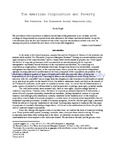The American Corporation and Poverty: The Potential for Corporate Social Responsibility

View/
Author
Bright, Nicole
Subject
Washington and Lee University, Shepherd Poverty Program
Social responsibility of business
Business ethics
Corporate culture -- Moral and ethical aspects
Metadata
Show full item recordDescription
Nicole C. Bright is a member of the Class of 2009 of Washington and Lee University School of Law. Capstone; [FULL-TEXT FREELY AVAILABLE ONLINE] In recent years, the corporate social responsibility (CSR) movement has re-emerged as a response to the failure of the current culture of corporate America to reflect a broad vision of the corporation's social purpose. 8 Today's CSR emphasizes internal, self-regulation; that is, a voluntary adjustment in corporate decision-making. But critics of the current movement, noting the dominance of the profit-maximizing culture, argue that CSR amounts to, at best, a public-relations exercise, and, at worst, "provid[es] a 'fig leaf' for corporate license."10 Such critics have concluded that the current culture is simply the inherent nature of the corporate form; that is, the corporation, as a complex entity, is incapable of socially responsible decision-making.
But this argument fails to acknowledge that the corporation is both a legal and social construct. There is, I would argue, no inherent nature to a "legal fiction;" there is simply a culture. It is a culture—dominated today by an obsessive focus on short-term profits—that both responds to and shapes public opinion. The purpose of this paper, beyond illuminating a connection between America's class of working-poor and the current business culture, is to argue that we as a society cannot expect a different morality, if we view profit-maximization as a morality, without a clear understanding of the role of the corporation as a social institution. [From Introduction] Nicole Bright